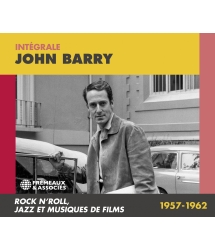- Our Catalog
- Philosophy
- Philosophers of the 20th century and today
- History of Philosophy (PUF)
- Counter-History and Brief Encyclopedia by Michel Onfray
- The philosophical work explained by Luc Ferry
- Ancient thought
- Thinkers of yesterday as seen by the philosophers of today
- Historical philosophical texts interpreted by great actors
- History
- Books (in French)
- Social science
- Historical words
- Audiobooks & Literature
- Our Catalog
- Jazz
- Blues
- Rock - Country - Cajun
- French song
- World music
- Africa
- France
- Québec / Canada
- Hawaï
- West Indies
- Caribbean
- Cuba & Afro-cubain
- Mexico
- South America
- Tango
- Brazil
- Tzigane / Gypsy
- Fado / Portugal
- Flamenco / Spain
- Yiddish / Israel
- China
- Tibet / Nepal
- Asia
- Indian Ocean / Madagascar
- Japan
- Indonesia
- Oceania
- India
- Bangladesh
- USSR / Communist songs
- World music / Miscellaneous
- Classical music
- Composers - Movie Soundtracks
- Sounds of nature
- Our Catalog
- Youth
- Philosophy
- News
- How to order ?
- Receive the catalog
- Manifesto
- Dictionnary











- Our Catalog
- Philosophy
- Philosophers of the 20th century and today
- History of Philosophy (PUF)
- Counter-History and Brief Encyclopedia by Michel Onfray
- The philosophical work explained by Luc Ferry
- Ancient thought
- Thinkers of yesterday as seen by the philosophers of today
- Historical philosophical texts interpreted by great actors
- History
- Books (in French)
- Social science
- Historical words
- Audiobooks & Literature
- Our Catalog
- Jazz
- Blues
- Rock - Country - Cajun
- French song
- World music
- Africa
- France
- Québec / Canada
- Hawaï
- West Indies
- Caribbean
- Cuba & Afro-cubain
- Mexico
- South America
- Tango
- Brazil
- Tzigane / Gypsy
- Fado / Portugal
- Flamenco / Spain
- Yiddish / Israel
- China
- Tibet / Nepal
- Asia
- Indian Ocean / Madagascar
- Japan
- Indonesia
- Oceania
- India
- Bangladesh
- USSR / Communist songs
- World music / Miscellaneous
- Classical music
- Composers - Movie Soundtracks
- Sounds of nature
- Our Catalog
- Youth
- Philosophy
- News
- How to order ?
- Receive the catalog
- Manifesto
- Dictionnary
1931-1962
Anthony Perkins, Eartha Kitt, Marlene Dietrich, Louis Armstrong, Billy Eckstine
Ref.: FA5910
EAN : 3561302591025
Artistic Direction : OLIVIER JULIEN
Label : FREMEAUX & ASSOCIES
Total duration of the pack : 2 hours 17 minutes
Nbre. CD : 2
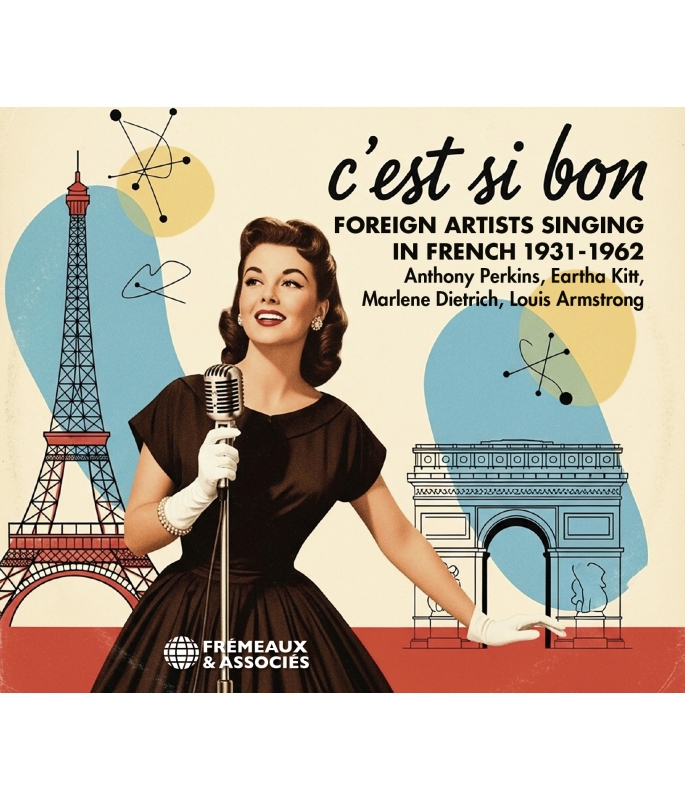
1931-1962
An irresistible invitation to a journey into the heart of the “so chic” glamour of 1950s and 1960s France! This 2-CD box set, curated by Olivier Julien, brings together tracks from major international artists like Blossom Dearie, Eartha Kitt, Marlene Dietrich, and Louis Armstrong, who ventured into French, the language of love. These unforgettable performances transport us back to an eternal Paris, with its restaurants, its fashion, and its music at the forefront of global sophistication.
Patrick FRÉMEAUX
CD1 : EARTHA KITT : C’EST SI BON • BAL PETIT BAL • UNDER THE BRIDGES OF PARIS • JE CHERCHE UN HOMME (I WANT A MAN). MARLENE DIETRIC : QUAND L’AMOUR MEURT • JE M’ENNUIE • ASSEZ • SYMPHONIE • LA VIE EN ROSE • JE TIRE MA RÉVÉRENCE • CHERCHE LA ROSE • OU VONT LES FLEURS ? • MARIE MARIE • DÉJEUNER DU MATIN. BLOSSOM DEARIE : TOUT DOUCEMENT • PLUS JE T’EMBRASSE • CHEZ MOI • L’ÉTANG. HILDEGARD KNEF : LA FILLE DE HAMBOURG • BAL DE VIENNE • C’ÉTAIT POUR JOUER • J’AIMERAIS TELLEMENT ÇA • QU’AVEZ-VOUS FAIT DE MON AMANT ?
CD2 : ANTHONY PERKINS : NE DIS PLUS RIEN • QUAND TU DORS PRÈS DE MOI • ON NE MEURT PAS POUR ÇA • IL N’Y A PLUS D’APRÈS. HAROLD NICHOLAS : JE NE PEUX PAS RENTRER CHEZ MOI • BÉBÉ MON BÉBÉ • LE LOCO-MOTION • À LA VIE, À L’AMOUR • OH OUI C’QUE J’AIME ÇA • DESAFINADO (FAITS POUR S’AIMER). BILLY ECKSTINE. “MR. B IN PARIS” : AVEC CES YEUX-LÀ • NUAGES • PARDONNEZ-MOI • LES FEUILLES MORTES • QUAND J’Y PENSE • LA VALSE DES LILAS • CHEZ-MOI • AIME-MOI • PLACE BLANCHE • JE SAIS QUE VOUS ÊTES JOLIE • TOUT DOUCEMENT • C’EST LUI L’AMOUR • BONUS TRACK : LOUIS ARMSTRONG : C’EST SI BON (IT’S SO GOOD).
DIRECTION ARTISTIQUE : OLIVIER JULIEN
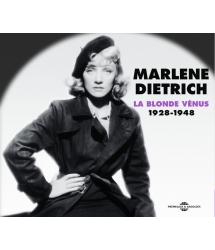
LA BLONDE VENUS 1928 - 1948
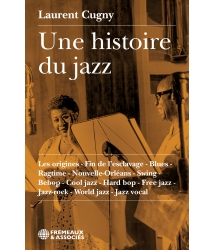
Un livre de Laurent Cugny
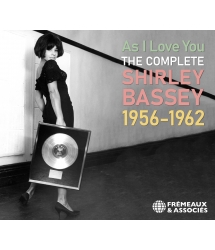
1956-1962
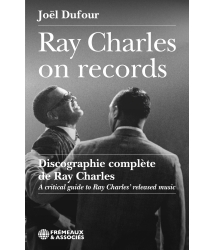
A critical guide to Ray Charles’ released music by...




-
PisteTitleMain artistAutorDurationRegistered in
-
1C’est si bonEartha KittAndré Hornez00:03:011953
-
2Bal petit balEartha KittFrancis Lemarque00:03:021953
-
3Under the bridges of ParisEartha KittBob Cochran00:02:421954
-
4Je cherche un homme (I Want a Man)Eartha KittGeorges Pazman00:02:511955
-
5Quand l’amour meurtMarlene DietrichOctave Crémieux00:03:101931
-
6Je m’ennuieMarlene DietrichWal-Berg00:03:121933
-
7AssezMarlene DietrichWal-Berg00:03:261933
-
8SymphonieMarlene DietrichAlex Alstone00:03:041945
-
9La vie en roseMarlene DietrichÉdith Piaf00:02:371954
-
10Je tire ma révérenceMarlene DietrichPascal Bastia00:03:231960
-
11Cherche la roseMarlene DietrichRené Rouzaud00:03:581962
-
12Ou vont les fleurs ?Marlene DietrichFrancis Lemarque00:03:351962
-
13Marie MarieMarlene DietrichPierre Delanoë00:04:361962
-
14Déjeuner du matinMarlene DietrichJacques Prévert00:02:481962
-
15Tout doucementBlossom DearieJean Mercadier00:02:231957
-
16Plus je t’embrasseBlossom DearieBen Ryan00:02:301958
-
17Chez moiBlossom DearieBruce Sievier00:03:071959
-
18L’étangBlossom DeariePaul Misraki00:02:241959
-
19La fille de HambourgHildegard KnefBoris Vian00:04:511958
-
20Bal de VienneHildegard KnefAlbert van Dam00:02:561958
-
21C’était pour jouerHildegard KnefBoris Vian00:03:211958
-
22J’aimerais tellement çaHildegard KnefBoris Vian00:03:041958
-
23Qu’avez-vous fait de mon amant ?Hildegard KnefHarry Warren00:02:341958
-
PisteTitleMain artistAutorDurationRegistered in
-
1Ne dis plus rienAnthony PerkinsBoris Vian00:02:591962
-
2Quand tu dors près de moiAnthony PerkinsFrançoise Sagan00:02:081962
-
3On ne meurt pas pour çaAnthony PerkinsRené Rouzaud00:02:071962
-
4Il n’y a plus d’aprèsAnthony PerkinsGuy Béart00:02:581962
-
5Je ne peux pas rentrer chez moiHarold NicholasCharles Aznavour00:02:311959
-
6Bébé mon bébéHarold NicholasPhilippe-Gérard00:02:571959
-
7Le loco-motionHarold NicholasGeorges Aber00:02:241962
-
8À la vie, à l’amourHarold NicholasPierre Saka00:02:131962
-
9Oh oui c’que j’aime çaHarold NicholasManou Roblin00:02:141962
-
10Desafinado (Faits pour s’aimer)Harold NicholasEddie Barclay00:02:171962
-
11Avec ces yeux-làBilly EckstineEddie Barclay00:03:051961
-
12NuagesBilly EckstineDjango Reinhardt00:03:321961
-
13Pardonnez-moiBilly EckstineAl Hoffman00:02:391961
-
14Les feuilles mortesBilly EckstineVladimir Kosma00:03:491961
-
15Quand j’y penseBilly EckstinePaul Misraki00:03:121961
-
16La valse des LilasBilly EckstineEddie Barclay00:02:591961
-
17Chez-moiBilly EckstineBruce Sievier00:02:591961
-
18Aime-moiBilly EckstineJacques Vidalin00:03:131961
-
19Place BlancheBilly EckstineBoris Vian00:02:351961
-
20Je sais que vous êtes jolieBilly EckstineHenri Christiné00:02:441961
-
21Tout doucementBilly EckstineRené Clausier00:03:021961
-
22C’est lui l’amourBilly EckstineQuincy Jones00:03:201961
-
23C’est si bon (It’s so Good)Louis ArmstrongJerry Seelen00:03:031950
Foreign Artists Singing In French 1931-1962
Anthony Perkins, Eartha Kitt, Marlene Dietrich, Louis Armstrong
By Olivier Julien
The French language is known to be the language of love, and as the majority of songs talk about love, many foreigners chose to record in the language of Molière.
Eartha Kitt is a unique figure in American culture. A woman of mixed race, she was one of the first to symbolize pluralistic America. Gifted with multiple talents, she sang in eleven different languages, performed in over a hundred countries, and has a star on Hollywood Boulevard. Her appearances in musical comedies were acclaimed, and although she never had a number one hit, she built a serious discographic career. She also developed a talent as an actress on stage as well as on the big and small screen. It was with the Teatro Americano for the revue Bal nègre in 1946 that Eartha Kitt discovered Paris. After performances in Mexico and London, the troupe performed in Paris at the Théâtre des Champs-Elysées. It was when she had to replace a singer during a show that Eartha Kitt realized she preferred singing to dancing. She then left the troupe and settled in the French capital in early 1949, where she made a name for herself as a cabaret singer, particularly at Le Bœuf sur le toit. This is how she appeared in the film Paris est toujours Paris, in which she sings and plays her own role. She then performed her first recital at the famous club Le Carroll’s in the eighth arrondissement of Paris. It was there that she was noticed by Orson Welles, who gave her her first major role in 1950 for the theatrical adaptation of Christopher Marlowe’s Dr Faust, in which she played Helen of Troy. Orson Welles then nicknamed her the most exciting woman in the world. Returning to the United States, she was hired for twenty weeks at the Blue Angel, then moved to the Village Vanguard where producer Leonard Stillman discovered her and chose her for the revue New Faces of 1952. Her interpretation of Monotonous is legendary and she held the role on Broadway for a year. For the album (33 tours 30 RCA Victor LOC 1008), she also performed Love is a simple thing with Rosemary O’Reilly, Robert Clary and June Carroll, and Bal petit bal by Francis Lemarque with Robert Clary. A national tour and a film of the same name produced by Twentieth Century Fox followed. On March 13, 1953, she recorded one of her most emblematic songs in New York, C’est si bon, written by André Hornez and Henri Betti. On the album That bad Eartha released in 1954 (33 tours 25 cm RCA Victor LPM 3187), she then adapted a classic French song Under the bridges of Paris (Sous les ponts de Paris) which reached seventh place on the 45-rpm chart in Great Britain. In 1955, she recorded
Je cherche un homme which was released as a
45-rpm.
Born in Berlin, and settled in the United States in the early 1930s, Marlene Dietrich died in Paris in 1992, in the eighth arrondissement where she lived, almost without ever moving, all the years that followed the end of her film career. At the age of four, Marlene Dietrich already spoke French thanks to her governess. She has always felt a deep attachment to France: “I have always loved France without knowing it, I loved the people without knowing them, a love without logic, not at all explainable”. Paris represents for her “a home that never disappoints.” She confesses the emotion that her favorite monument, the Arc de Triomphe, gives her as a symbol of the Parisian Resistance to the Occupant. She says she is proud and grateful to have received decorations obtained not for celebrity or power, but for her commitment. From 1931, she recorded a title in French Quand l’amour meurt by Octave Crémieux (78 tours 25 cm His master’s voice E.G. 2275) which was released in Great Britain, Germany and Czechoslovakia. In 1933, she devoted both sides of her new 78-rpm to French songs by interpreting Je m’ennuie and Assez to music by Wal-Berg (78 tours 25 cm Polydor 530 000). From the thirties, she became involved in the fight against Nazism and enlisted during the Second World War with the Allied troops while living a love story with the actor Jean Gabin. She sang on the fronts for the soldiers and became a secret agent. Her songs, such as Lili Marlene, reflected her commitment. At the end of the war, she recorded a new title in French: Symphonie (78 tours 25 cm Decca 23456) which tells of a lost love. In 1954, Marlene Dietrich performed in London at the Café de Paris for a recital during which she sang La vie en rose by Édith Piaf (33 tours 30 cm Columbia Masterworks ML 4975). During her concerts in Rio in 1959, she created the title Je tire ma révérence, signed by Pascal Bastia and orchestrated by Burt Bacharach (33 tours 30 cm Philips Réalités V 31). In the fall of 1959, the Théâtre de l’Étoile was to host Marlene Dietrich’s recital. The event was of great importance: the Blue Angel had not performed on a Parisian stage since 1945. Jacques Canetti was responsible for setting up the operation consisting at the same time in promoting the album Marlene, a luxurious French pressing of the album Dietrich in Rio (orchestrated by Burt Bacharach), which Philips was preparing to release. He suggested to Marlene that she record titles in French and contacted Serge Gainsbourg who wrote her two songs: Le cirque and Les nanas au Paradis. There were no follow-ups and she recorded a four-track EP (extended play) in which she sang Gilbert Becaud, Françis Lemarque, Henri Salvador and Jacques Prévert: Cherche la rose, Où vont les fleurs (adaptation of Sag mir wo die Blumen sind), Marie Marie, and Déjeuner du matin released in 1962 (45 tours EP La voix de son maitre EGF 597).
Blossom Dearie revolutionized jazz with her soft and childlike voice. A talented pianist steeped in American and French cultures, she helped publicize great authors on both sides of the Atlantic. A Parisian by adoption, she founded the vocal group Les Blue Stars and it was thanks to Eddie Barclay that she landed a record contract. The first solo album by Blossom Dearie is an instrumental album recorded in Paris on which she accompanied herself on the piano before being signed by the prestigious American jazz label Verve records which would bring her international recognition. From her first American album she recorded Comment allez-vous which only has the title in French and Tout doucement signed by Émile Jean Mercadier and René Clausier (33 tours 30 cm Verve records MG V-2037). For her second sung album released in 1958, she recorded Plus je t’embrasse which became a classic (33 tours 30 cm Verve Records - MGV-2081). Thomas Dutronc would admit to having been greatly inspired by Blossom Dearie’s version of Plus je t’embrasse for his own version on the album Frenchy in 2020. For the 1959 album My gentleman friend (33 tours 30 cm Verve records MG V-2125), she performed two titles by Paul Misraki: Chez moi and L’étang and covered Charles Trenet’s Boum in English.
The French singing career of the German actress Hildegard Knef (Hildegarde Neff) is closely linked to Boris Vian. Before that, Hildegard Knef appeared in several films before the fall of Nazi Germany, but most were only released afterwards. During the Battle of Berlin, she dressed as a soldier to stay with her lover, Ewald von Demandowsky, head of the Tobis sound film company, and joined him in the defense of Schmargendorf. The Soviets captured her and sent her to a prisoner camp. Her cellmates helped her escape and return to Berlin. Ewald Von Demandowsky was executed by the Russians on October 7, 1946, but before that, he ensured his friend Hildegard Knef the protection of the famous actor Viktor de Kowa in Berlin, who gave her the opportunity to be a master of ceremonies in the theater he had opened. Knef also played a role in Marcel Pagnol’s Marius, directed by Boleslaw Barlog. Viktor de Kowa also directed Knef in other plays by Shakespeare, Pagnol and George Abbot. She played the female lead in The Murderers Are Among Us (Die Mörder sind unter uns, Wolfgang Staudte, 1946), the first film to be shown in the Soviet sector after the Second World War. She held another title role in The Sinner (Die Sünderin, Willi Forst, 1951), a film causing a scandal with the scene where she appeared in the simplest device, in the first nude scene of German cinema. In the fifties, Hildegard Knef had an international career in France and the United States after changing her name. Known abroad as Hildegarde Neff, she then appeared in the war film Decision Before Dawn by Anatole Litvak (1951), then notably with Tyrone Power in Diplomatic Courier by Henry Hathaway (1952), in the classic The Snows of Kilimanjaro by Henry King (1952) or even The Man Between by Carol Reed in 1953. In 1955-1956, she was successful on Broadway in the musical Silk Stockings by Cole Porter. Returning to Germany in 1957, she began a new career in singing. While in Paris, she starred in La fille de Hambourg in 1958 and formed a relationship with Boris Vian who wrote the original song for the film La fille de Hambourg (45 tours 17 cm EP 460.583 ME). She recorded another four-track EP in France and in French with three titles signed by Boris Vian: the French adaptation of Bal de Vienne, as well as two titles composed by Henri Salvador: C’était pour jouer and J’aimerais tellement ça as well as a fourth title Qu’avez-vous Fait De Mon Amant ? to close the record. After that, she wrote the lyrics for her own songs. With the composer Hans Hammerschmid, she composed her greatest successes and the album Knef (1970). After a majority of war or spy films in the 50s, Hildegard Knef turned to classical or historical roles the following decade, as evidenced by her appearance in The Threepenny Opera again under the direction of Wolfgang Staudte in 1962. We also see her confronting Landru in 1962 in the film by Claude Chabrol, playing Queen Catherine in Catherine of Russia by Umberto Lenzi in 1963, fighting against giant monsters in The People of the Abyss by Michael Carreras in 1968 or fighting against a Hollywood producer in Fedora by Billy Wilder (1978).
If Anthony Perkins, born April 4, 1932, is better known as an actor, notably for his role as Norman Bates in Alfred Hitchcock’s film Psycho in 1960, his honorable career as a singer remains little known. He began his singing career in 1956 with Friendly persuasion, which Pat Boone made a hit the same year, and recorded no less than four albums and a significant number of 45-rpm records. His acting career began on the stage, on Broadway in the early fifties before making his debut in cinema in The Actress by George Cukor and chain-acting as young leading men. His most striking interpretation of this decade remains that of Joseph in 1958 in René Clément’s film This Angry Age based on the novel by Marguerite Duras. He then acted in minor films such as the westerns The Lonely Man by Henry Levin and Tin Star by Anthony Mann in 1957. He nevertheless starred in The Big Country by William Wyler, Palme d’Or at the Cannes Film Festival in 1957 and in which he appeared alongside Gary Cooper and Dorothy McGuire. In 1959, he shared the poster of the ambitious science fiction film On the Beach by Stanley Kramer with Fred Astaire, Gregory Peck and Ava Gardner. In 1960, Alfred Hitchcock entrusted him with the role of Norman Bates in Psycho, his only “horror” film, shot in black and white, also starring Janet Leigh, Vera Miles, John Gavin and Martin Balsam. Perkins’ performance was fascinating, the film was a triumph. Perkins’ career took a turn and his notoriety became international. The following year, he starred in the film Phaedra by Jules Dassin, where he played Hippolytus opposite Melina Mercouri in the role of Phaedra. For the film Goodbye Again by Anatole Litvak (1961), an adaptation of the novel by Françoise Sagan of the same name, he won the acting prize in Cannes and also recorded the film’s song: Quand tu dors près de moi (lyrics by Françoise Sagan and music by Georges Auric) for his album Anthony Perkins chante en français, as well as Ne dis plus rien, signed by Boris Vian and Henri Salvador, On ne meurt pas pour ça with lyrics by Henri Rouzaud to music by André Popp who arranged the album which concludes with a cover of Il n’y a plus d’après by Guy Béart. In 1962, Anthony Perkins was chosen by Orson Welles to play Joseph K. in his adaptation of Kafka: The Trial, which would be one of the films of Perkins’ European period, during which he also filmed with Claude Chabrol in The Champagne Murders (1967) and Ten Days’ Wonder, in which he reunited with Welles, this time as an actor. After that, Anthony Perkins would appear in less notable films or in more important films in which his role would be minor such as Is Paris Burning? by René Clément in 1966, The Sword and the Balance by André Cayatte in 1963, The Life and Times of Judge Roy Bean by John Huston in 1973 or Murder on the Orient Express by Sidney Lumet in 1974. In 1990, while he was shooting a fourth episode of Psycho which he directed (none of the three films following the original having been directed by Hitchcock), he learned that he was suffering from AIDS, one of the complications of which would be pneumonia which carried him away on September 12, 1992.
Harold Nicholas was born on March 27, 1921 in Winston-Salem, North Carolina, USA. He is the youngest of the tap dancing duo The Nicholas Brothers with his brother, Fayard Nicholas, seven years his senior. Harold and Fayard began their careers as children. Born into a family of musicians, the boys witnessed the performances of all the black artists of the twenties. As fascinated by circus acrobats as by the dancers of this period, they observed and imitated until they became a real attraction. Their beginnings in Philadelphia were an immediate success and their reputation quickly expanded. In 1932, they were headlining the legendary Cotton Club alongside Cab Calloway and Duke Ellington, singing a little and dancing a lot, elegantly dressed in tailcoats and top hats. Harold Nicholas was then eleven years old and his brother eighteen years old. They performed in vaudeville, on Broadway, in clubs, on television and in film musicals. Harold appeared in more than fifty films including The Big Broadcast of 1936, Down Argentine Way (1940), Tin Pan Alley (1940), and Sun Valley Serenade (1941). Fred Astaire declared that their roles in Stormy Weather (1943) produced the best number in a musical he had ever seen. In this film, the brothers danced on the drums and frolicked among the orchestra musicians. The Hollywood career of the Nicholas Brothers began when they were spotted in a club by Samuel Goldwyn who hired them as actors in Kid Millions in 1934. They became big screen stars despite racial segregation which prohibited them from talking scenes as well as those with their white co-stars. Their last film together was The Pirate in 1948 in which they danced with Gene Kelly, thus breaking the racial barrier. Harold Nicholas then continued as a solo artist and went into exile in France. He continued touring as a singer and dancer. After a single 45-rpm record in 1952 in the United States, his real discographic career began in France in 1959 with Fontana then with Barclay for which he recorded several albums, some of which were in French. Accompanied by Boris Vian’s sidekick: Jimmy Walter, he covered Je ne peux pas rentrer chez moi by Charles Aznavour as well as Bébé mon bébé (45 tours 17 cm EP Fontana 460.627 ME) then the French version of Le loco-motion (popularized by Sylvie Vartan), À la vie, à l’amour, and Oh oui c’que j’aime ça (45 tours 17 cm EP Barclay 70477) in 1962. The same year, he recorded the French adaptation of Desafinado (Faits pour s’aimer) signed by Eddie Barclay to music by Antônio Carlos Jobim (45 tours 17 cm EP Barclay 70486). Also in 1962, he appeared in the film The Night of the Empire by Pierre Grimblat. He occasionally returned to the United States to perform with his brother and appeared in films such as Uptown Saturday Night (1974) and Tap (1989). Harold made his last screen appearance in The Five Heartbeats (1991). He died on January 3, 2000 at the age of 79.
Billy Eckstine was born William Clarence Eckstein in Pittsburgh, Pennsylvania, USA and sang from the age of seven in the Episcopal church of East Liberty in the suburbs of Pittsburgh. When his family moved to Washington D.C., after finishing high school, he was admitted to St. Paul’s College in Lawrenceville, Virginia, then, thanks to a scholarship, he entered Howard University in Washington in 1932 in the sports and athletics education section. Alongside his student life, he sang with Tommy Myle’s jazz orchestra, imitating Cab Calloway. After an injury, he was forced to leave university in 1933 but won a singing prize in an amateur competition at the Howard Theatre located at 620 T Street in the Northwest neighborhood of Washington. In 1939, Billy Eckstine joined the big band of pianist Earl Hines, the Grand Terrace Orchestra, and had a series of successes: I’m Falling for You, Skylark, Somehow and blues arranged for big jazz band: Jelly Jelly, Stormy Monday Blues. Three years later, after listening to jazz singer Sarah Vaughan at an amateur show, he hired her for Earl Hines as well as Dizzy Gillespie and Charlie Parker. In 1944, “Mr B” formed his own big band, bringing together a new generation of jazzmen Sarah Vaughan, Charlie Parker, Dizzy Gillespie, Art Blakey, Fats Navarro, Miles Davis, Gene Ammons, Dexter Gordon and Tadd Dameron among others. Billy Eckstine’s orchestra is considered the first great be-bop orchestra and raced to the top 10 of the charts, notably with A Cottage for Sale and Prisoner of Love. At the end of the forties, Eckstine, now a solo singer, signed with the new MGM records label and immediately met with success with the revisits of Everything I have is yours (1947), Blue moon (1948) by Rodgers and Hart and Caravan by Juan Tizol (1949). During a European tour in 1957, between albums for the Roulette label, he recorded an album entirely sung in French in Paris for the British label Felsted Mr. B in Paris accompanied by the orchestra of Bobby Tucker. This album, probably the least known and rarest of Billy Eckstine’s records, has never been reissued on CD, and is today considered one of his best. Mr.B in Paris was produced by Quincy Jones (then based in Paris) and arranged by Jones, Billy Byers and Bobby Tucker. The orchestra was recorded in 1957 in Paris and the voices were recorded in 1958 in London. The only identified musicians are Don Byas (tenor saxophone), Bobby Tucker (piano), Pierre Michelot (bass) and Kenny Clarke (drums). The album is composed of twelve titles and has prestigious signatures: Avec ces yeux-là (Eddie Barclay / Michel Legrand), Nuages (Django Reinhardt / Steve Williams), Pardonnez-moi, Les feuilles mortes (Vladimir Kosma / Johnny Mercer / Jacques Prévert), Quand j’y pense (Paul Misraki), La valse des Lilas (Michel Legrand / Eddie Barclay), Chez-moi (Bruce Sievier / Jean Féline / Paul Misraki), Aime-moi (Jacques Vidalin / Yvan Datin), Place blanche (Henri Salvador / Boris Vian), Je sais que vous êtes jolie (Henri Christiné / Henri Poupon), Tout doucement (René Clausier / Jean Mercadier), C’est lui l’amour (Quincy Jones / Jean Broussolle).
Olivier Julien
© Frémeaux & Associés 2025
DISCOGRAPHIE - C’est si bon - Foreign artists singing in french
CD1
Eartha Kitt
1 - C’est si bon (André Hornez / Henri Betti / Jerry Seelen)
Avec Henri René et son orchestre
33 tours 25 cm RCA Victor LPM 3062 - 1953
2 - Bal petit bal (Avec Robert Clary) (Francis Lemarque)
Direction d’orchestre par Anton Coppola
33 tours 30 RCA Victor LOC 1008 - 1953
3 - Under the bridges of Paris (Bob Cochran / Jean Rodor / Vincent Scotto)
Avec Henri René et son orchestre
33 tours 25 cm RCA Victor LPM 3187 - 1954
4 - Je cherche un homme (I want a man) (Georges Pazman / Michel Emer / Ramon Pina / Yves Bruyere)
Avec Henri René et son orchestre et choeurs
45 tours SP 17 cm RCA Victor 47- 6319 - 1955
Marlene Dietrich
5 - Quand l’amour meurt (Octave Crémieux)
Orchestre dirigé par Peter Kreuder
78 tours 25 cm His master’s voice E.G. 2275 - 1931
6 - Je m’ennuie (Wal-Berg / Camille François)
7 - Assez (Wal-Berg / Émile Stern / Jean Tranchant)
Accompagnée par l’orchestre de Wal-Berg dirigé Peter Kreuder
78 tours 25 cm Polydor 530 000 - 1933
8 - Symphonie (Alex Alstone / Taber / Roger Bernstein)
Orchestre dirigé par Charles Magnante
78 tours 25 cm Decca 23456 - 1945
9 - La vie en rose (Édith Piaf / Louiguy)
Avec le Café de Paris Orchestra dirigé par George Smith
33 tours 30 cm Columbia Masterworks ML 4975 - 1954
10 - Je tire ma révérence (Pascal Bastia)
Supervision musicale : Burt Bacharach
33 tours 30 cm Philips Réalités V 31 - 1960
11 - Cherche la rose (René Rouzaud / Henri Salvador)
12 - Ou vont les fleurs ? (Francis Lemarque / René Rouzaud / Peter Seeger)
13 - Marie Marie (Pierre Delanoë / Gilbert Bécaud)
14 - Déjeuner du matin (Jacques Prévert / Joseph Kosma)
Orchestre dirigé par Burt Bacharach
45 tours EP La voix de son maitre EGF 597 - 1962
Blossom Dearie
15 - Tout doucement (Jean Mercadier / René Clausier)
Blossom Dearie : Piano, Ray Brown : Basse, Herb Ellis : Guitare, Jo Jones : Batterie
33 tours 30 cm Verve records MG V-2037 - 1957
16 - Plus je t’embrasse (Ben Ryan / Max François)
Blossom Dearie : Piano, Ray Brown : Basse, Herb Ellis : Guitare, Jo Jones : Batterie
33 tours 30 cm Verve records MG V-2081 - 1958
17 - Chez moi (Bruce Sievier / Jean Féline / Paul Misraki)
18 - L’étang (Paul Misraki)
Blossom Dearie : Piano, Ray Brown : Basse, Kenny Burrell : Guitare, Bobby Jaspar : Flûte
33 tours 30 cm Verve records MG V-2125 - 1959
Hildegard Knef
19 - La fille de Hambourg (Boris Vian/ Jean Ledrut)
Avec André Persiany et son orchestre
45 tours 17 cm EP 460.583 ME - 1958
20 - Bal de Vienne (Albert van Dam / Boris Vian / Sammy Gallop)
21 - C’était pour jouer (Boris Vian / Henri Salvador)
22 - J’aimerais tellement ça (Boris Vian / Henri Salvador)
23 - Qu’avez-vous fait de mon amant ? (Harry Warren / Marcel Duhamel)
Avec André Persiany et son orchestre
45 tours 17 cm EP 460.591 ME - 1958
CD2
Anthony Perkins
1 - Ne dis plus rien (Boris Vian / Henri Salvador)
2 - Quand tu dors près de moi (Françoise Sagan / Georges Auric)
3 - On ne meurt pas pour ça (René Rouzaud / André Popp)
4 - Il n’y a plus d’après (Guy Béart)
Direction d’orchestre André Popp
45 tours 17 cm EP Pathé EG 591 - 1962
Harold Nicholas
5 - Je ne peux pas rentrer chez moi (Charles Aznavour)
6 - Bébé mon bébé (Philippe-Gérard / René Lagary)
Avec Jimmy Walter, son orchestre et choeurs
45 tours 17 cm EP Fontana 460.627 ME - 1959
7 - Le loco-motion (Georges Aber / Gerry Goffin / Carole King)
8 - À la vie, à l’amour (Pierre Saka / Jean Renard)
9 - Oh oui c’que j’aime ça (Manou Roblin / Gene Redd)
Avec Jimmy Walter, son orchestre et choeurs
45 tours 17 cm EP Barclay 70477 - 1962
10 - Desafinado (Faits pour s’aimer) (Eddie Barclay / Antônio Carlos Jobim)
Accompagné par Os Bossa Nova
45 tours 17 cm EP Barclay 70486 - 1962
BillY Eckstine. “Mr. B in Paris”
11 - Avec ces yeux-là (Eddie Barclay / Michel Legrand)
12 - Nuages (Django Reinhardt / Steve Williams)
13 - Pardonnez-moi (Al Hoffman / Al Goodhart / Ed Nelson)
14 - Les feuilles mortes (Vladimir Kosma / Johnny Mercer / Jacques Prévert)
15 - Quand j’y pense (Paul Misraki)
16 - La valse des Lilas (Michel Legrand / Eddie Barclay)
17 - Chez-moi (Bruce Sievier / Jean Féline / Paul Misraki)
18 - Aime-moi (Jacques Vidalin / Yvan Datin)
19 - Place Blanche (Henri Salvador / Boris Vian)
20 - Je sais que vous êtes jolie (Henri Christiné / Henri Poupon)
21 - Tout doucement (René Clausier / Jean Mercadier)
22 - C’est lui l’amour (Quincy Jones / Jean Broussolle)
Avec l’orchestre de Bobby Tucker, produit par Quincy Jones
33 tours 30 cm Felsted FL 7507 - 1961
Bonus track
Louis Armstrong
23 - C’est si bon (It’s so good) (Jerry Seelen / André Hornez / Henri Betti)
Avec Sy Oliver et son orchestre
33 tours 25 cm SP Decca 27113 - 1950


